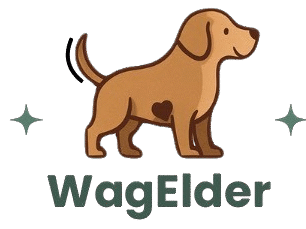Senior dogs often face many bone and joint problems. One of the most common among them is Osteoarthritis in Senior Dogs. Osteoarthritis is a degenerative joint disease where the cartilage in the joints slowly wears down, leading to pain, stiffness, and difficulty in movement.
In fact, more than 70% of dogs over the age of 10 suffer from some form of arthritis. The disease develops slowly, and if not treated in time, it can eventually stop the dog from walking altogether.
What is Osteoarthritis?
Osteoarthritis, commonly known as arthritis, is a degenerative joint disease in which the cartilage of the joints gradually breaks down.
Cartilage is a soft tissue that covers the ends of bones and prevents them from rubbing against each other. When the cartilage wears away, the bones start rubbing together, causing pain, swelling, and stiffness.
This condition is more common in senior dogs because as they age, their body’s natural healing ability decreases, cartilage repair becomes limited, and extra body weight puts additional stress on the joints.

Symptoms
The symptoms of osteoarthritis appear slowly and are often mistaken as normal signs of aging. Many owners think their dog is just slowing down with age, but in reality, the dog may be in pain. Some common signs of osteoarthritis in senior dogs include:
- Walking slowly and difficulty climbing up or down stairs
- Trouble getting up or sitting down, less interest in playing
- Limping while walking and swelling in the legs
- Sleeping more, being less active, and sometimes irritability due to pain
- Muscle thinning and licking or biting the painful area
Causes
Some major causes of osteoarthritis in senior dogs are:
- Genetics: Certain breeds are more prone, such as German Shepherds, Labrador Retrievers, and Golden Retrievers.
- Joint injury or fracture: Old fractures, hip or knee problems, torn ligaments, or past injuries can lead to osteoarthritis.
- Obesity: Excess weight puts pressure on joints, speeding up cartilage deterioration.
- Poor nutrition: Lack of proper nutrition prevents healthy bone and joint development.
Treatment
There is no complete cure for osteoarthritis in senior dogs, but there are ways to reduce pain and improve their quality of life.
- Medications and Supplements
- NSAIDs: Non-steroidal anti-inflammatory drugs are the best option to reduce pain and swelling, but they should only be given under veterinary guidance.
- Joint supplements: Glucosamine and chondroitin sulfate help support cartilage health. Omega-3 fatty acids also help reduce inflammation.
- Alternative Therapies
- Acupuncture: Helps relieve pain and relax muscles.
- Laser therapy: Uses light energy to reduce inflammation and promote tissue repair.
- Physical therapy: A professional vet or therapist can design special exercises and massage plans for your dog.

Home Care
- Diet
- Provide a balanced diet
- Include Omega-3 fatty acids
- Give calcium and vitamin supplements
- Exercise
- Take your dog for short walks
- Gentle stretching, but avoid too much exercise
- Swimming can help if available
- Weight Management
- Prevent obesity
- Feed light but nutritious food
- Comfortable Environment
- Provide a soft bed
- Keep your dog warm in cold weather since symptoms get worse in winter
- Ensure non-slippery flooring to prevent falls
Conclusion
Osteoarthritis in Senior Dogs is a common but serious condition. Caring for an elderly dog with arthritis can be challenging, but with the right knowledge and veterinary support, you can greatly improve your dog’s quality of life. Early detection, proper treatment, and home care can help your furry friend stay comfortable and active even in their senior years.


Add a Comment